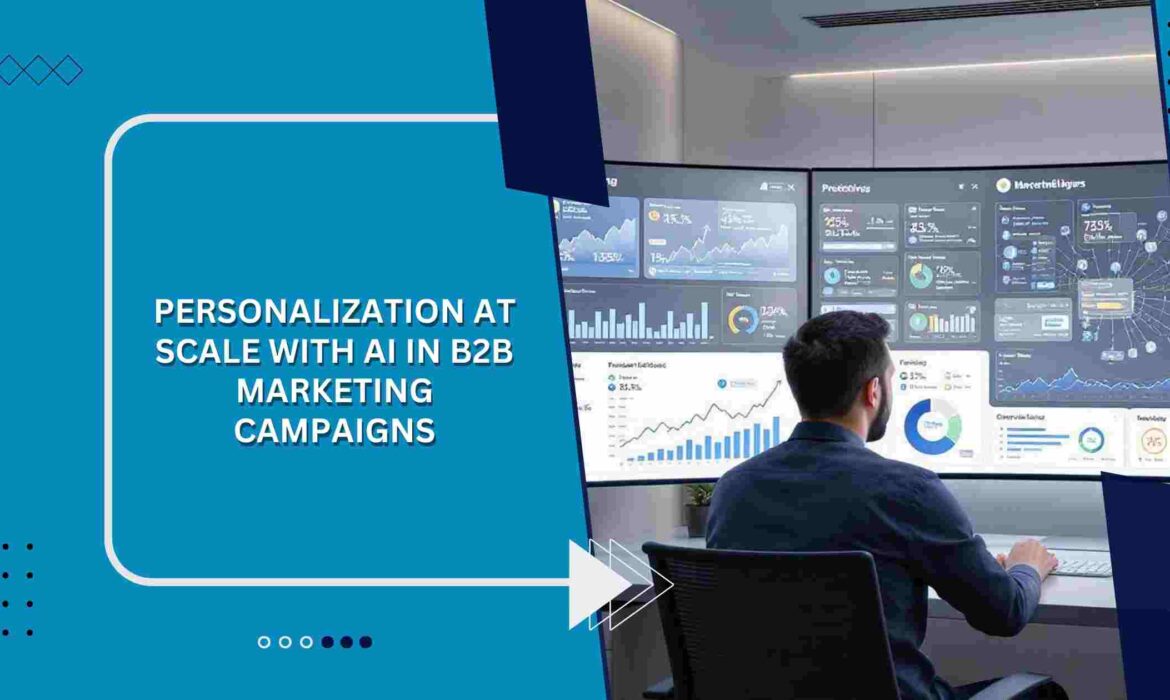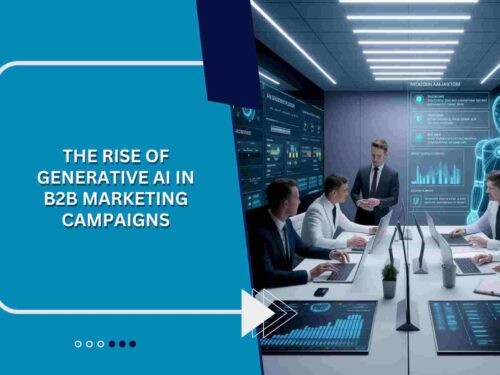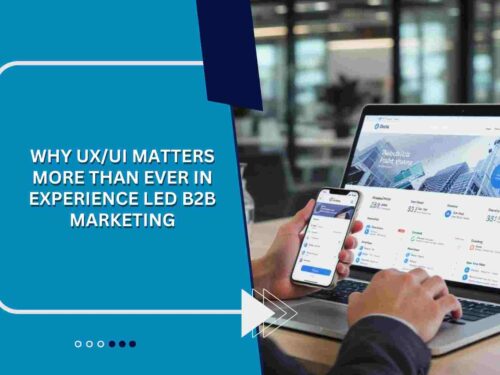The era of generic, one-size-fits-all messaging in B2B Marketing Campaigns is rapidly fading. Modern business buyers expect interactions that feel relevant, timely, and tailored to their needs. Personalization isn’t just a competitive advantage anymore it has become a necessity. However, scaling personalized campaigns across hundreds or thousands of prospects is nearly impossible without advanced technology. That’s where Artificial Intelligence (AI) steps in to redefine how companies connect with business audiences.
AI makes it possible to go beyond basic segmentation and deliver contextual, human-like personalization across the entire buyer journey. From predictive analytics to conversational chatbots, AI is equipping marketers with tools to craft smarter B2B Marketing Campaigns that resonate at scale.
Why Personalization is Vital in Modern B2B Marketing
Business decision-makers are flooded with information every day. A generic pitch is more likely to be ignored than acknowledged. Research indicates that personalized outreach drives higher engagement rates, longer interactions, and stronger conversion. In fact, tailored experiences influence nearly every stage of the B2B funnel awareness, consideration, and decision-making.
What makes personalization critical in B2B Marketing Campaigns is that buyers aren’t just businesses; they’re individuals within organizations who crave the same relevant experiences they encounter in consumer marketing. AI bridges this gap by enabling businesses to understand unique buyer needs and act on them in real time.
The Role of AI in Delivering Personalization at Scale
Scaling personalization in B2B Marketing Campaigns requires processing vast amounts of data, identifying meaningful patterns, and delivering targeted messaging. Manual efforts simply cannot keep up. AI revolutionizes this process by automating insights and orchestrating hyper-targeted campaigns across multiple touchpoints.
Here are key ways AI is powering personalization at scale:
1. Advanced Segmentation and Targeting
Traditional segmentation relies on firmographics like company size, industry, or location. AI goes further by analyzing intent data, behavior patterns, and engagement history to create micro-segments. This allows B2B Marketing Campaigns to deliver precise messaging that resonates with niche buyer personas.
2. Predictive Analytics for Buyer Behavior
AI models can predict future buyer actions by analyzing past interactions. For example, if a prospect frequently engages with whitepapers about cloud security, predictive tools can identify their interest in cybersecurity solutions. This ensures B2B Marketing Campaigns proactively address their needs before competitors do.
3. Dynamic Content Customization
AI enables real-time content personalization, from website experiences to email campaigns. Instead of sending the same asset to every lead, AI dynamically selects case studies, product demos, or blog content that aligns with each user’s behavior. This level of personalization increases engagement and accelerates conversions in B2B Marketing Campaigns.
4. Conversational AI and Chatbots
AI-powered chatbots provide immediate, context-driven responses to prospects. These tools not only answer questions but also recommend relevant content, schedule demos, and even qualify leads. Integrated into B2B Marketing Campaigns, conversational AI ensures that engagement is available 24/7 without straining human resources.
5. Automated Campaign Optimization
AI continually learns from campaign data, optimizing performance in real time. From adjusting ad bids to refining subject lines in emails, AI ensures that B2B Marketing Campaigns adapt dynamically for maximum impact. This eliminates wasted spend and improves ROI.
Benefits of AI-Powered Personalization in B2B
AI doesn’t just make personalization possible it transforms B2B Marketing Campaigns into measurable growth engines. Businesses embracing AI-driven strategies enjoy a range of benefits:
- Higher Engagement Rates: Personalized campaigns capture attention more effectively.
- Improved Lead Quality: AI filters out irrelevant leads by targeting prospects with genuine buying intent.
- Accelerated Sales Cycles: Tailored content helps prospects make decisions faster.
- Scalable Operations: Automation allows marketers to manage large audiences without sacrificing personalization.
- Data-Driven Decisions: Continuous feedback loops ensure campaigns evolve based on real performance insights.
By merging automation with empathy, AI enables B2B Marketing Campaigns to maintain a human touch while scaling outreach to thousands of prospects.
Practical Applications of AI in B2B Marketing Campaigns
AI is not a distant concept it’s already being applied in real-world B2B Marketing Campaigns. Let’s look at practical use cases that are reshaping the landscape:
1. Personalized Email Campaigns
AI tools analyze open rates, click behavior, and content preferences to craft email journeys tailored to individual prospects. Instead of blasting generic newsletters, businesses can send curated content that aligns with a recipient’s buying stage.
2. Account-Based Marketing (ABM)
AI takes ABM to the next level by enabling real-time personalization for high-value accounts. From targeted ads to customized landing pages, AI ensures that ABM strategies deliver maximum value.
3. Content Recommendation Engines
Similar to streaming platforms, AI suggests the right content at the right time. For B2B Marketing Campaigns, this means prospects receive resources that address their exact pain points, increasing engagement and trust.
4. Sales Enablement Insights
AI equips sales teams with insights about buyer intent, enabling them to tailor pitches. For example, if AI detects that a prospect is researching competitor comparisons, sales reps can proactively highlight differentiators.
5. Social Media Personalization
AI tracks engagement across platforms and tailors paid campaigns for specific audience clusters. This ensures that B2B Marketing Campaigns resonate with prospects where they are most active.
Challenges of Scaling Personalization with AI
While AI offers immense potential, implementing personalization at scale isn’t without challenges:
- Data Quality Issues: AI relies on accurate and clean data. Inconsistent or incomplete data can undermine personalization efforts.
- Integration Complexities: AI tools must work seamlessly with existing CRMs, marketing automation platforms, and analytics systems.
- Balancing Automation with Human Touch: Over-automation can make interactions feel robotic, so businesses must strike a balance.
- Ethical Considerations: Using AI responsibly, with transparency around data usage, is essential for building trust in B2B Marketing Campaigns.
Addressing these challenges requires a well-planned strategy, proper governance, and ongoing optimization.
The Future of B2B Marketing Campaigns with AI
Looking ahead, AI’s role in personalization will only deepen. Emerging technologies like generative AI, natural language processing, and predictive lead scoring will bring even sharper accuracy to B2B Marketing Campaigns. Businesses will be able to orchestrate end-to-end buyer journeys that feel personalized, seamless, and value-driven at every interaction.
Soon, AI will not only personalize outreach but also predict market shifts, automate complex workflows, and craft content with near-human creativity. Companies that adopt these innovations early will lead the next wave of transformation in B2B marketing.
Take the Next Step with Smarter B2B Campaigns
Personalization at scale is no longer optional it’s the backbone of high-performing B2B Marketing Campaigns. AI gives marketers the ability to engage buyers with precision, relevance, and efficiency, unlocking greater ROI and deeper relationships.
If you’re ready to elevate your B2B strategies with AI-driven personalization, connect with Acceligize. who can help you design and execute campaigns that deliver real business impact.




